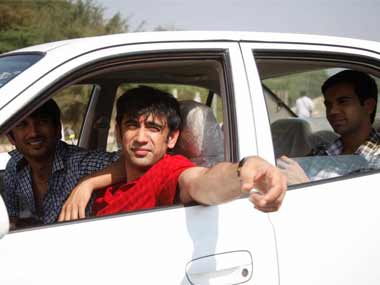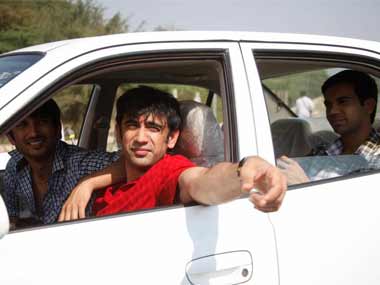Kai Po Che is not really the perfect film. You might say it awkwardly steam-rolls all that our generation knows about Gujarat into one Jai-Veeru-ish potboiler. The earthquake of 2001, the riots of 2002, cricket, love, sex, dhokha et al. [caption id=“attachment_641639” align=“alignleft” width=“380”]  A still from Kai Po Che. Image courtesy: Facebook.[/caption] But something about a film with three never heard of actors, a hardly-there actress and no floor burning item song, must have caught the imagination of the masses for it to gross Rs 17 crores in two days and run to full houses on weekdays. Is it the promise of a Dil Chahta Hai set in Gujarat? Is it the promised break from 40-year-olds trying to play twenty-somethings on screen? Or is it because anything Gujarat right now is hot property? Snigdha Poonam points out in New York Times India Ink: “In turning his decidedly political book into a feel-good Bollywood spectacle, Mr Bhagat has, on the face of it, done nothing less than rewrite history in favor of Gujarat’s chief minister, Narendra Modi of the BJP, who has been dogged by questions over his role in the 2002 riots.” She points out how, Bhagat, who is one of the four people who worked on the screenplay, watered down the otherwise strong political implications of his novel to turn it into a generalized depiction of religious fanaticism. Poonam has a point. Kai Po Che never depicts the riots as an act of state sponsored violence as it is widely perceived to be. It in fact, places the blame of the riots to on the isolated decision of one Hindu local leader, therefore exonerating the party and its leaders of the responsibility. But in 2013, when Modi-worship has taken on hitherto unseen dimensions, a film like Kai Po Che and the overwhelming response it has received is probably a pointer at the fact that there is some critical thinking left in the political narrative of the country - a narrative that has gotten increasingly polarised into a BJP-Congress debate. When, even the informed, intelligent sections of the country are in a hurry to forget the killing of hundreds as a thing of the past, does Kai Po Che sound out a conscience call? We’ll see. Read Snigdha Poonam’s article on New York Times India Ink here.
When, even the informed, intelligent sections of the country are in a hurry to forget the killing of hundreds as a thing of the past, does Kai Po Che sound out a conscience call?
Advertisement
End of Article


)
)
)
)
)
)
)
)
)



